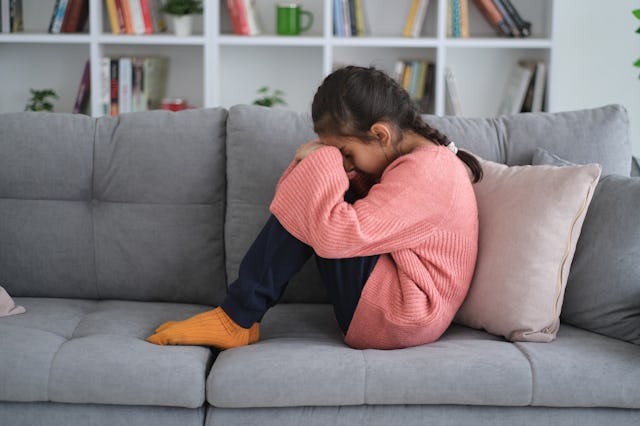CDC Reports Teen Girls Are Suffering From Sadness & Violence At Alarming Rates
Scary Mommy spoke to Dr. Aimee Koerner-Frank, PsyD. to see why there’s an alarming uptick in numbers.

It used to be mostly pop quizzes and cafeteria table hierarchy that made your stomach churn with nerves in those adolescent years. Now, it seems like teens are dealing with much more real problems that are truly pushing them to the brink.
Ever-present issues like gun violence, climate change, and laws that target their identity and reproductive rights are causing unprecedented level of hopelessness, depression, and suicidal thoughts among America's young women, according to the Centers for Disease Control and Prevention (CDC).
Oh, can’t forget the ever-present COVID-19 pandemic and years of isolation and online learning.
All of that piled on top of the “normal” kinds of issues teen girls deal with like gossip and hormones and body image issues, and it really shouldn’t come as that big of a surprise that young women are particularly susceptible to experiencing sadness and hopelessness.
However, the recent statistics released by the CDC are extremely alarming.
In 2021, 3 in 5 girls felt persistently sad and hopeless, a marker for depressive symptoms, up nearly 60% from 2011.
According to the CDC, more than 1 in 4 girls reported they seriously considered attempting suicide in 2021, up nearly 60% from 2011. More than 1 in 10 girls reported they attempted suicide in 2021, up 30% from a decade ago.
So, why the staggering jump in numbers?
One explanation, or part of an explanation, is that girls have been feeling this way in the past, but have only recently been able to talk about it.
“Previous numbers have been a gross underestimate of how many children, teens and young adults have or will experience a mental health issue. This is especially true for girls and LGBQ+ youth,” Dr. Aimee Koerner-Frank, PsyD. and President of Vine Counseling Center told to Scary Mommy.
Koerner-Frank explains that women and young girls have, for generations, been taught by society to push down or “mask” their feelings which could explain the smaller numbers from previous years.
“For these groups, individually and collectively, they often are required to ‘mask’ or ‘go along to get along.’ That often means that they will say everything is fine or nothing is wrong because they don't want to cause any problems, have already experienced violence, and understand that they may be harmed and/or feel nothing will change.”
The CDC also reported that alcohol use was higher among girls than boys. “The access and use of substance is often an attempt to cope with the symptoms such as intrusive thoughts of suicide, feelings of hopeless, sadness, extremely low self worth,” Koerner-Frank explains.
One of the most shocking data points from the CDC’s latest report was the 10% jump in teen girls’ feelings of sadness and hopelessness from 2019 to 2021. One could assume that this large increase was due to the COVID-19 pandemic.
Koerner-Frank expands on that theory. “One important aspects from the pandemic is that it brought mental health issues to the forefront of issues that were impacting families, which included children, teens, and young adults,” she explains.
“For many, the impact of the pandemic included increased isolation, lack of participation in highly desired activities, family stressors, lack of support from other adults such as teachers/coaches.”
Koerner-Frank said that for some teen athletes, the sudden halt in school sports due to the pandemic left a sizable hole in their identity.
“For many, this caused significant depression and anxiety. Additionally, many felt that they lost their self identity,” she continues.
There also could be a connection to teen girls’ sadness and depression rates and that of their parents. “Over the past several years, other family members may have also experienced a higher level of financial, employment related issues and psychological stressors,” she explains.
All that time at home with family members and adult figures who were also reeling the stressors of modern day life could have created a chain reaction.
So, what can parents do if they feel concern for their teen daughter?
“Check-in with your child by asking open ended questions about their day, interests, and friends,” Koerner-Frank recommends. “As parents, we often focus on their grades, which can cause increased symptoms because they are typically trying to manage many areas of their lives.”
Also, don’t ignore your child’s cry for help whether obvious or not so obvious. “We look for a change in behaviors or mood, which may include a change in grades, increased isolation, decreased/increased sleep routine, lack of enjoyment, friendship/romantic conflict, romantic break-up, and responses to social media,” Koerner-Frank says.
However, some teens may be more direct. “If your child or young person indicates that they would like to talk to a therapist, please take this request seriously. Children and young adults know much more about talking about emotions and asking for help. The quicker you can provide services the more likely you are to decrease the severity of symptoms,” she continues.
At the end of the day, it is up the adults — parents, caregivers, teacher, coaches — in a young woman’s life to give her the guidance she needs and provide her with the proper coping skills that can implement their entire life.
Even if it appears your teen daughter seems to be skating by fine in the throes of adolescence in the 21st century, still check in with them.
Koerner-Frank concludes, “Talk to your child because they may not be going through these difficulties; however, they will most likely have a friend or friends who have. Allowing your child to talk openly and safely will provide them with the opportunity to trust and know that you love and support them freely.”
Contact the 988 Suicide & Crisis Lifeline if you are experiencing mental health-related distress or are worried about a loved one who may need crisis support. Call or text 988. Chat at 988lifeline.org.